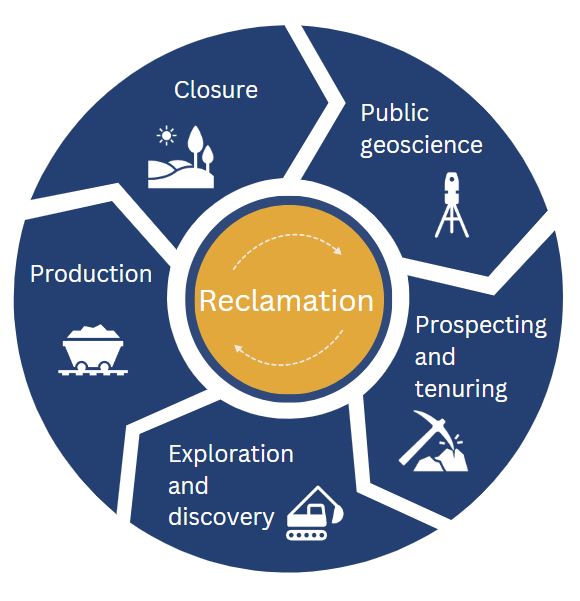Mining life cycle and permitting
The provincial government regulates all mining activities in British Columbia. Activities include exploration, production, reclamation and closure. This applies to all mineral, coal, placer, sand, gravel, and quarry operations.
Mine lifecycle
Stages of the mining lifecycle:
Occurs throughout the lifecycle:
Stages of the mining lifecycle

Legislation
The Mines Act and the accompanying Health, Safety and Reclamation Code for Mines in British Columbia (the Code), along with a Mines Act permit are the regulatory requirements related to mining activities. Learn more about mining related legislation.
Public geoscience is a collection of data, information, and publications. This information can identify mining opportunities and lead to investment in the mining industry.
The British Columbia Geological Survey (BCGS) creates and disseminates public geoscience information that supports effective mineral exploration, sound land use management, responsible governance, and attracts investment.
- Researching
- Mapping
- Hand-sampling
- Airborne geophysical surveys
- Other works with minimal physical disturbance of the land
- Drilling
- Excavation, trenching and test pits
- Site reclamation
- Developing access via road, water or air, etc.
- Advanced exploration activities, such as bulk sampling
Moving from exploration to production follows different processes depending on the mine type.
- Mineral or coal
- Sand and gravel
- Quarry
- Placer
Production mining activities require a Mines Act permit. The major mines office issues and authorizes Mines Act permits for producing mineral and coal mines. Regional permitting offices issue and authorize permits for producing quarry, placer, and sand and gravel mines.
- Production reserves are exhausted
- Resource extraction is no longer economically viable
- Removing equipment such as vehicles and processing equipment
- Dismantling facilities such as mills and workers’ quarters
- Safely closing all mine workings
Ministry strategic documents
Contact information
- Regional mines offices
- Mines incident reporting
- Mines inquiries and complaints
- Geological survey
- Major mines
- Mine health and safety
- Mines auditing
- Mineral titles
